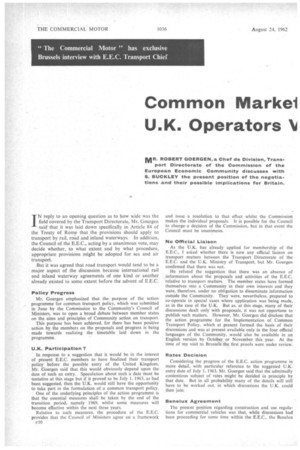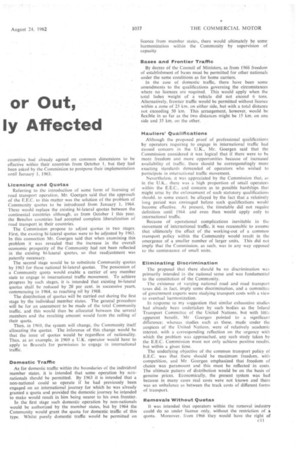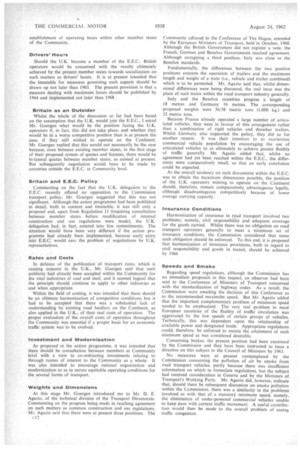Common Markel or Out, U.K. Operators Ni ly Affected
Page 38

Page 39

Page 40

If you've noticed an error in this article please click here to report it so we can fix it.
IN reply to an opening question as to how wide was the field covered by the Transport Directorate, Mr. Goergen said that it was laid down specifically in Article 84 of the Treaty of Rome that the provisions should apply to transport by rail, road and inland waterways. In addition, the Council of the E.E.C., acting by a unanimous vote, may decide whether, to what extent and by what procedure, appropriate provisions might be adopted for sea and air transport.
But it was agreed that road transport would tend to be a major aspect of the discussion because international rail and inland waterway agreements of one kind or another already existed to some extent before the advent of E.E.C.
Policy Progress Mr. Goergen emphasized that the purpose of the action, programme for common transport policy, which was submitted in June by the Commission to the Community's Council of Ministers, was to open a broad debate between member states on the aims and principles of Community action on transport.
This purpose has been achieved, for there has been positive action by the members on the proposals and progress is being made towards realizing the timetable laid down in the programme.
U.K. Participation ?
In response to a suggestion that it would be in the interest of present E.E.C. members to have finalized their transport policy before the possible entry of the United Kingdom, Mr. Goergen said that this would obviously depend upon the date of such an entry. Speculation about such a date must be tentative at this stage but if it proved to be July I, 1963, as had been suggested, then the U.K. would still have the opportunity to take part in the formulation of a common transport policy.
One of the underlying principles of the action programme is that the essential measures shall be taken by the end of the transition period, namely 1969, whilst some measures will become effective within the next three years.
Relative to such measures, the procedure of the E.E.C. provides that the Council of Ministers agree on a framework c 10
and issue a resolution to that effect whilst the Commission makes the individual proposals. It is possible for the Council to change a decision of the Commission, but in that event the Council must be unanimous.
No Official Liaison As the U.K. has already applied for membership of the E.E.C., I asked whether there is now any official liaison on transport matters between the Transport Directorate of the E.E.C. and the U.K. Ministry of Transport, but Mr. Goergen confirmed that there was not.
He refuted the suggestion that there was an absence of information about the proposals and activities of the E.E.C. relative to transport matters. The member states have formed themselves into a Community in their own interests and they were, therefore, under no obligation to disseminate information outside the Community. They were, nevertheless, prepared to co-operate in special cases where application was being made, as in the case of the U.K. But as, at this stage, many of their discussions dealt only with proposals, it was not opportune to publish such matters. However, Mr. Goergen did disclose that the action programme for the Implementation of Common Transport Policy, which at present formed the basis of their discussions and was at present available only in the four official languages of the Community, would also be available in an English version by October or November this year. At the time of my visit to Brussels the first proofs were under review,
Rates Decision Considering the progress of the E.E.C. action programme in more detail, with particular reference to the suggested U.K. entry date of July I, 1963, Mr. Goergen said that the admittedly contentious subject of rates might be decided in principle by that date. But in all probability many of the details will still have to be worked out, in which discussions the U.K. could then join, Benelux Agreement The present position regarding construction and use regulations for commercial vehicles was that, while discussions had been proceeding for some time within the E.E.C., the Benelux countries had already agreed on common dimensions to be effective within their countries from October 1, but they had been asked by the Commission to postpone their implementation until' January 1, 1963.
Licensing and Quotas Referring to the introduction of some form of licensing of road transport operation, Mr. Goergen said that the approach of the E.E.C. to this matter was the solution of the problem of Community quotas to be introduced from January 1, 1964. These would replace the existing bi-lateral quotas between the continental, countries although, as from October 1 this year. the Benelux countries had accepted complete liberalization of road transport in their countries.
The Commission propose to adjust quotas in two stages. First, the existing bi-lateral quotas were to be adjusted by 1963. In this connection Mr. Goergen said that when examining this problem it was revealed that the increase in the overall economic prosperity of the Community had not been reflected in the existing bi-lateral quotas, so that readjustment was patently necessary.
The second stage would be to substitute Community quotas by 1963 for these national hi-lateral quotas. The possession of a Community quota would enable a carrier of any member state to engage in international traffic movement. To achieve progress by such stages, it is intended that existing bi-lateral quotas shall be reduced by 20 per cent. in successive years, commencing in 1964, so reaching nil by 1968.
The distribution of quotas will be carried out during the first stage by the individual member states. The general procedure will be for an assessment to be made of the total Community traffic, and this would then be allocated between the several members and the resulting amount would form the ceiling of their quota.
Then. in 1969, the system will change, the Community itself allocating the quotas. The inference of this change would be that the issue of quotas would be regardless of nationality. Thus, as an example, in 1969 a U.K. operator would have to apply to Brussels for permission to engage in international traffic.
Domestic Traffic
As for domestic traffic within the boundaries of the individual member states, it is intended that some operation by nonnationals should be permitted. By 1963 it is intended that a non-national could so operate if he had previously been engaged on an international journey for which he was already granted a quota and provided the domestic journey he intended to make would result in him being nearer to his own, frontier.
In the first stage such domestic operation by non-nationals would be authorized by the member states, but by 1964 the Community would grant the quota for domestic traffic of this type. Whilst purely domestic traffic would be permitted on licence from member states„ there would ultimately be some harmonization within the Community by supervision of capacity.
Bases and Frontier Traffic By decree of the Council of Ministers, as from 1966 freedom of establishment of bases must be permitted for other nationals under the same conditions as for home carriers.
In the case of domestic traffic, there have been some amendments to the qualifications governing the circumstances where no licences are required. This would apply when the total laden weight of a vehicle did not exceed 6 tons. Alternatively, frontier traffic would be permitted without licence within a zone of 25 km. on either side, but with a total distance not exceeding 50 km. This arrangement, however, would be flexible in so far as the two distances might be 15 km. on one side and 35 km. on the other.
Hauliers' Qualifications Although the proposed proof of professional qualifications by operators requiring to engage in international traffic had caused concern in the U.K., Mr. Goergen said that the Commission considered it was logical that if there were to be more freedom and more opportunities because of increased availability of traffic. there should be correspondingly more exacting standards demanded of operators who wished to participate in international traffic movement.
Nevertheless, It was appreciated by the Commission that, as in the U.K.. there was a high proportion of small operators within the E.E.C., and concern as to possible hardships that might arise by the enforcement of such statutory qualifications should, to some extent. be allayed by the fact that a relatively long period was envisaged before such qualifications would become effective. At present, the timetable did not require definition until 1964.. and even then would apply only to international traffic.
Because of operational complications inevitable in the Movement of international traffic, it was reasonable to assume that ultimately the effect of the working-out of a common transport policy within the Community would result in the emergence of a smaller number of larger units. This did not imply that the Commission, as such, was in any way opposed to the continuance of small units.
Eliminating Discrimination The proposal that there should be no discrimination was primarily intended in the national sense and was fundamental to the constitution of the Community.
The existence ot varying national road and road transport taxes did, in fact, imply some discrimination, and a committee of government experts were studying transport costs with a view to eventual harmonization.
In response to my suggestion that similar exhaustive studies had already been undertaken by such bodies as the Inland Transport Committee of the United Nations, but with little apparent benefit, Mr. Goergen pointed to a significant difference; whereas studies such as these, made under the auspices of the United Nations, were of relatively academic interest, with a corresponding reflection on the urgency with which the problem was approached, any such study taken by the E.E.C. Commission must not only achieve positive results. but within a given time.
The underlying objective of the common transport policy of E.E.C. was that there should be maximum freedom, with competition, and Mr Goergen emphasized that freedom of choice was paramount and this must be reflected in costs. The ultimate pattern of distribution would be on the basis of genuine prices. Economically, the present system was bad because in many cases real costs were not known and there was an unbalance as between the track costs of different forms of transport.
Removals Without Quotas
It was intended that operators within the removal industry could do so under licence only. without the restriction of a quota. Moreover, from 1966 they would have the right of c 1 1
establishment of operating bases within other member states of the Community.
Drivers' Hours Should the U.K. become a member of the E.E.C., British operators would be concerned with the results ultimately achieved by the present member states towards socialization on such matters as drivers' hours. It is at present intended that the timetable for measures governing such aspects should be drawn up not later than 1963. The present provision is that a measure dealing with maximum hours should be published by 1964 and implemented not later than 1968.
Britain as an Outsider Whilst the whole of the discussion so far had been based on the assumption that the U.K. would join the E.E.C.. I asked Mr. Goergen what would be the position facing the U.K. operators if, in fact, this did not take place, and whether they would be in a worse competitive position than is at present the case, if they still wished to operate on the Continent. Mr. Goergen replied that this would not necessarily be the case because, even between existing member states, in the first stage of their proposed system of quotas and licences, there would be hi-lateral quotas between member states, as existed at present. But subsequently negotiation would have to be made by countries outside the E.E.C. at Community level.
Britain and E.E.C. Policy
Commenting on the fact that the U.K. delegation to the E.E.C. recently offered no opposition to the Commission transport policy, Mr. Goergen suggested that this was not significant. Although the action programme had been published in detail, both in content and timetable, it was still only a proposal and, apart from Regulation 11 (requiring consultation between member states before modification of internal construction and use regulations were made), the U.K. delegation had, in fact, entered into few commitments. The• situation would have been very different if the action programme had already been implemented, because early entry into E.E.C. would east: the problem of negotiations by U.K. representatives.
Rates and Costs In defence of the publication of transport rates, which is causing concern in the U.K., Mr. Goergen said that such publicity had already been accepted within the Community for the vital industries of coal and steel, and it seemed logical that the principle should continue to apply to other industries as and when appropriate.
Within the field of costing, it was intended that there should be an ultimate harmonization of competitive conditions, but it had to be accepted that there was a substantial lack of understanding by existing road hauliers on the Continent, as also applied in the U.K., of their real costs of operation. The proper evaluation of the overall costs of operation throughout the Community was essential if a proper basis for an economic traffic system was to be evolved.
Investment and Modernization As proposed in the action programme, it was intended that there should be consultation between members at Community level with a view to co-ordinating investments relating to through routes of interest to the Community as a whole. It was also intended to encourage rational organization and modernization so as to secure equitable operating conditions for the several forms of transport.
Weights and Dimensions
At this stage Mr. Goergen introduced me to Mr. D. E. Agazio, of the technical division of the Transport Directorate. Commenting on the progress being made in reaching agreement on such matters as common construction and use regulations, Mr. Agazio said that there were at present three positions. The
Community adhered to the Conference of The Hague, attended by the European Ministers of Transport, held in October, 1960. Although the British Government did not register a vote, the French, German and Benelux Governments reached agreement. Although occupying a third position. Italy was close to the Benelux standards.
Fundamentally, the differences between the two positive positions concern the operation of trailers and the maximum length and weight of a train (i.e., Vehicle and trailer combined) which is to be permitted. Mr. Agazio said that. whilst dimensional differences were being discussed, the real issue was the place of such trains within the road transport industry generally.
Italy and the Benelux countries propose a length of 18 metres and Germany 16 metres. The corresponding proposed weights were 36/38 metric tons (1,000 kg.) and 32 metric tons.
Because France already operated a large number of articulated vehicles, they were in favour of this arrangement rather than a combination of rigid vehicles and drawbar trailers. Whilst Germany also supported the policy, they did so for another reason, It was their intention to so reorientate commercial vehicle population by encouraging the use of articulated vehicles so as ultimately to achieve greater fluidity of traffic generally. Mr. Agazio added that, whilst no agreement had yet been reached within the E.E.C., the differences were comparatively small, so that an early conclusion could be expected.
As the overall tendency on such discussions within the E.E.C. was to obtain the maximum dimensions possible, the position of the U.K. operators wishing to operate on the Continent should, therefore, remain comparatively advantageous legally, although disadvantageous competitively because of lower average carrying capacity.
Insurance Conditions Harmonization of insurance in road transport involved two problems; namely, civil responsibility and adequate coverage for the goods carried. Whilst there was no obligation on road transport operators generally to meet a minimum set of insurance conditions. the Commission considered that some such obligation should be enforced. To this end, it is proposed that harmonization of insurance provisions, both in regard to civil responsibility and goods in transit, should be achieved by 1966 Speeds and Smoke Regarding speed regulations. although the Commission has no immediate proposals in this respect, an observer had been sent to the Conference of Ministers of Transport concerned with the standardization of highway codes. As a result, the Commission were awaiting the decision of this Conference as to the recommended maximilm speed. But Mr. Agazio added that the important complementary problem of minimum speed needed to be emphasized. The very real problem in most European countries of the fluidity of traffic circulation was aggravated by the low speeds of certain groups of vehicles. Technically, this was dependent upon the relationship of available power and designated loads. Appropriate regulations could, therefore, be enforced to ensure the attainment of such Minimum speed as was considered desirable.
Concerning brakes, the present position had been examined by the Commission and they have been instructed to issue a directive on this subject to the Council of Ministers by 1963.
No measures were at present contemplated by the Commission concerning the pollution of air by smoke from road transport vehicles, partly because there was insufficient information on which to formulate regulations, but the subject had received consideration in Geneva and by the Ministers of Transport's Working Party. Mr. Agazio did, however, indicate that, should there be subsequent discussion on smoke pollution within the Commission, there was a similarity in the problems involved as with that of a statutory minimum speed, namely, the elimination of under-powered commercial vehicles unable to keep pace with current traffic movement. A useful contribution would then be made to the overall problem of easing traffic congestion.








































































































